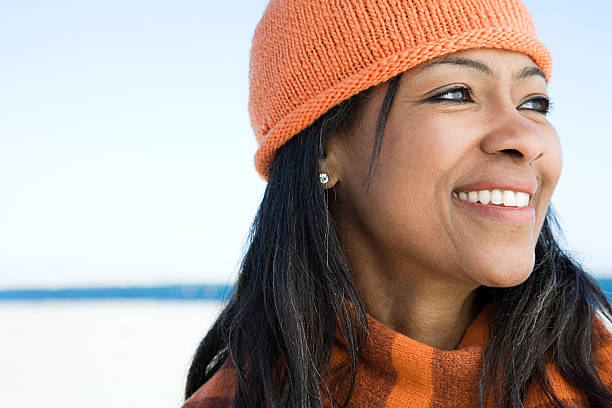
Black hair care techniques should change throughout the year, especially during the winter, thanks to the cooler temperatures and drier air.
Winter weather can wreak havoc on black hair if no extra care is taken, since excessive dryness leads to hair breakage and a dry scalp.
The key to winterizing your hair care regimen is switching to a routine that causes very little stress on your hair throughout winter while preserving moisture. So how do you do this?
Winter hair care tips for black hair
First, some basics:
• Retain Moisture. The most important key to combating dryness during the winter is to protect your hair by retaining moisture. Add water to your diet and regimen by drinking at least 8 glasses of water a day and enjoying water-rich fruits and vegetables, such as tomatoes, cucumbers, strawberries and peaches.
• Shampoo your hair once a week. Remember that it's not necessary to shampoo your hair every day, since washing Black hair too often can strip it of its much-needed natural oils, especially during winter months, when the hair and scalp are already drier than usual.
Also, remember to use cooler water when wetting your hair, and to be extra-gentle with wet locks. Try spraying your hair with a leave-in conditioner, using a wide-tooth comb, and blotting with a soft towel (as opposed to vigorously rubbing it, which can lead to even more breakage).
READ THIS: 5 Best Shampoos For Black Hair
In addition to the above basic steps, there are some other essential things you need to do.
I. Minimize The Heat
The quickest way to cause breakage is by using excessive heat. Minimize the use of heating tools to prevent breakage.
• Prepare Your Hair. If you decide to use a heating tool, use a hair product to protect your hair from heat. In addition, you can also use a leave-in conditioner accompanied by a heat-protecting hair serum to replenish moisture.
• Air Dry. Try letting your hair air dry instead of using a blow dryer.
• Limit Combing. If you choose to comb your hair while it’s dry, try finger combing instead of using a comb. This will reduce breakage. If you do use a comb, be sure to use a wide-tooth shower comb.
• Use A Cooler Setting. When using a blow dryer, try using a cooler temperature setting. Your hair may take longer to dry, but it will minimize heat damage.
II. Moisturize and Condition Often
To combat winter dryness, this is a crucial step. Moisturizing is extremely important during winter. Also, deep conditioners and hot oil treatments help restore and replenish moisture to your hair.
• Use a moisturizer daily or leave-in conditioner. A leave-in conditioner can do great things for dry and brittle hair.
• Try to use leave-in conditioners with natural ingredients. Some ingredients such as sodium laurel sulfate, mineral oil, and petrolatum cause more dryness, so avoid using products with these ingredients.
• Pamper your hair naturally at least once a week. Natural, intensive moisturizers like aloe, shea butter, jojoba or avocado oils can hydrate and revitalize the driest hair.
• Deep condition. If your hair becomes persistently dry during the winter, use a deep conditioner or a hot oil treatment.
These products tend to be ultra-moisturizing and great for Black hair (you can even use a homemade deep conditioner with mayo or avocado). Hot oil treatments are great for replenishing moisture, as well. You can use a variety of different oils for great results, but the best oil to use is jojoba oil, because it is considered to be most like the natural hair oil, called sebum, which is produced from the sebaceous glands in the scalp. Ask your stylist for suggestions regarding the particular products you should use.
III. Protect
The best way to protect your hair during winter is to always try to cover your hair during winter, and include some additional care tips in your everyday routine.
• Do not go outside with wet hair. Not only can you get sick, but this bad habit can also cause breakage. Depending on where you live and how cold it gets, your hair could even freeze.
• Keep your hair wrapped and protected at night. Try wearing a satin bonnet or a scarf to prevent your hair from drying while you sleep.
• Wear protective styles (i.e. buns, braids, cornrows, etc). If you’re going to wear your hair in a bun, try to avoid pulling your hair, thus adding stress to your hairline. Wearing protective styles helps preserve your hair throughout the winter.
• Tame flyaways. Dry air can cause static, making even well-moisturized hair unruly. Carry a few unscented anti-static dryer sheets. Pass one over the top of your head to immediately calm flyaways.
• Wear a hat or a scarf. Wearing some sort of hat or scarf that’s loose enough to allow scalp circulation will protect your hair against cold winds.
Note that some materials, such as wool, tend to be more harmful to Black hair, but since you really shouldn’t venture out into the cold without head protection, try to wear a hat that has a satin lining – or create your own lining.
Following these simple winter hair care tips for black hair during winter will help prevent some of the winter damage and breakage.








